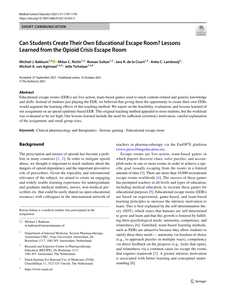Abstract Educational escape rooms (EERs) are live-action, team-based games used to teach content-related and generic knowledge and skills. Instead of students just playing the EER, we believed that giving them the opportunity to create their own EERs would augment the learning efects of this teaching method. We report on the feasibility, evaluation, and lessons learned of our assignment on an opioid epidemic-based EER. This original teaching method appealed to most students, but the workload was evaluated to be too high. Our lessons learned include the need for sufcient (extrinsic) motivation, careful explanation of the assignment, and small group sizes.
MULTIFILE

This paper aims to present a systematic literature review on state-of-the-art Educational Escape Rooms (EERs) with the use of digital technologies. More specifically, the focus of the study is to present the current developments and trends concerning Digital Educational Escape Rooms (DEERs) and investigate how they foster learning outcomes for online learners. Additionally, the present study provides insights into the design process of such technology enhanced EERs. This review is attributed to identifying and covering research gaps since the current literature has focused on the pedagogical aspects of Escape Rooms (ERs) in education, but no studies seem to have been conducted in regard to the pedagogical implications of Digital Escape Rooms (DERs) in educational environments. Based on the exhaustive literature review, an agenda for future research is promised and the implications for designing innovative ER approaches have been highlighted. The anatomy of the fundamental components of conducting systematic literature reviews was followed. The results of the review could be addressed to multidisciplinary teams related to education, game researchers, educational researchers, faculty members, scholars, instructors, and protagonists of educational systems to encourage them to thoroughly study the core elements of DEERs and how they can be applied in virtual educational contexts to facilitate students’ learning achievements.
DOCUMENT

Educational escape rooms (EERs) are increasingly used in education as learning innovations for non-digital and game-based learning (GBL) since EERs positively influence student motivation. They are common in educational fields where skills developments are vital such as STEM subjects and healthcare. However, EERs are marginally implemented in entrepreneurship education (EE) because there is a lack of evaluated design elements to guide the creation of EER in this context, which hampers their wider adoption. Therefore, in this study, we evaluated design elements for EERs in EE. We are particularly concerned with experiential EE since EERs are well suited for experiential learning. We used a research-through-design approach and created an EER based on 11 design elements derived from the literature on social cognitive theory, entrepreneurship competence, and gamification. We created and evaluated the EER in two cycles with two diverse groups of students at a university of applied sciences in the Netherlands. We contribute to the literature and practice of experiential EE by presenting evaluated design elements for EERs. We show which design elements work well and which do not. We also present a comprehensively designed EER that educational professionals can implement in their experiential EE programs.
DOCUMENT

Energy transition is key to achieving a sustainable future. In this transition, an often neglected pillar is raising awareness and educating youth on the benefits, complexities, and urgency of renewable energy supply and energy efficiency. The Master Energy for Society, and particularly the course “Society in Transition”, aims at providing a first overview on the urgency and complexities of the energy transition. However, educating on the energy transition brings challenges: it is a complex topic to understand for students, especially when they have diverse backgrounds. In the last years we have seen a growing interest in the use of gamification approaches in higher institutions. While most practices have been related to digital gaming approaches, there is a new trend: escape rooms. The intended output and proposed innovation is therefore the development and application of an escape room on energy transition to increase knowledge and raise motivation among our students by addressing both hard and soft skills in an innovative and original way. This project is interdisciplinary, multi-disciplinary and transdisciplinary due to the complexity of the topic; it consists of three different stages, including evaluation, and requires the involvement of students and colleagues from the master program. We are confident that this proposed innovation can lead to an improvement, based on relevant literature and previous experiences in other institutions, and has the potential to be successfully implemented in other higher education institutions in The Netherlands.